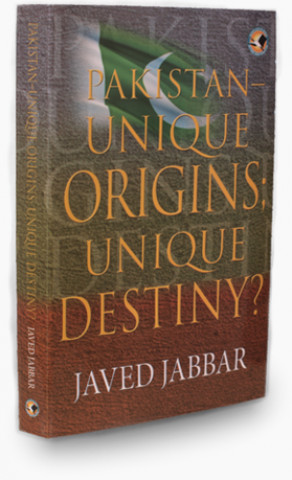Fanning optimism may not have been right for Javed Jabbar at a time when people, by and large, are coming out of the state of denial, the comforting persecution complex is losing its hold on the paranoid national psyche, the intelligentsia has slackened its search for scapegoats; the fatigue of complacence has started to hurt; and a kind of rudimentary self examination is in process.
His new book, "Pakistan - Unique Origins; Unique Destiny?", which counts 57 blessings that will lighten any heart heavy with doubts and misgivings and lull some back to the stupor they were just waking from, also lists 38 items of stained laundry that soil the nation’s sartorial image.
But first the blessings. Our hospitality, bravery, fearlessness, open-mindedness, compassion, commitment to justice and democracy, pragmatism, resilience in face of adversity, hardiness are not all the legendary virtues that Javed Jabbar (JJ), has picked from the archives of our national mythology. There is this abiding trait of our people that they “carry on regardless”. True. ‘How?’ is another matter.
‘Respect for all religions’ that is mentioned could be a cherished goal but is not a fact as even within Islam the various sects show little tolerance to each other. Newsweek did say we were probably the most hospitable of societies but did it mention how we show the door to the poor relative and allow millions of our children to sleep on an empty belly.
Then, ‘excellence in school education’? Pray, sir, it is the most criminally neglected sector in the public domain. As for private schools, can we shut our eyes to their robbery? And how this might be forcing many parents to dishonest ways? But this is true, and ought to be, we are the largest contributors of soldiers to peace-keeping operations abroad and yet have many more to spare for duties at home.
Javed Jabbar has mentioned 14 elements of ‘Pakistaniat’ of which “pride in being part of a troubled, tormented yet distinctive and exclusive persona called Pakistan” actually reflects the nation’s matchless sense of humour, its ability to laugh at its weaknesses and take delight in its absurdities. Few people have it in as much as we have. In the West one may be sure the Americans certainly don’t have it in any noticeable measure, the way they coddle a namby-pamby patriotism, the way they sit in their patios with their dog and the over-sized Star and Stripes! The way they burst into childish applause when the plane touches down on native soil.
Pakistanis’ obsessive interest in politics is another of their strong virtues which has saved them from the Assads, Mobaraks and Qaddafis of this land. But ‘blind faith in a stable Pakistan’ that JJ mentions did figure once in Pakistaniat, not any longer. In fact deep distress and concern at what is happening are now the new signs of Pakistan’s strength.
Two ‘not so good reasons that make Pakistan’s history unique’ according to JJ are the country’s disintegration in 1971 and being “the only nation state in the world in which the majority of the population separated from its own nation state and in which the minority of the population retained the original name of the nation state”. This is indeed unique as the right to retain the country’s name was that of the Eastern wing’s but they discarded it as the symbol of all that was bad, but the truncated smaller part retained it as “the people of West Pakistan felt pride and passion for the name and concept of Pakistan because it represents a great vision worth pursuing and fulfilling.”
Pakistan’s destiny which even JJ’s vibrant and vigorous optimism could not prevent him from tagging a question mark to it, would depend on the following four likely scenarios that would draw the road map of its future: 1, a single leader emerges, so tall, so inspiring, so solid in character that she/he galvanizes the whole nation, inspires unity, discipline and a new dynamism; 2, a new collective leadership emerges across different parties and provinces, transcending divisions, working together for national renewal; 3, a worsening of the present trends. More violence. More break down. Then: catharsis. And a new hope emerges; 4, a general mass movement begins for progressive change, with only nominal leaders, but very strong followers. The author favours the second option and thinks that the country is passing through the third.
Published in The Express Tribune.
Review: Jabbar's 'living, breathing, bustling Pakistan’
Javed Jabbar's book counts 57 blessing in the country and lists 38 items of stained laundry.



COMMENTS
Comments are moderated and generally will be posted if they are on-topic and not abusive.
For more information, please see our Comments FAQ